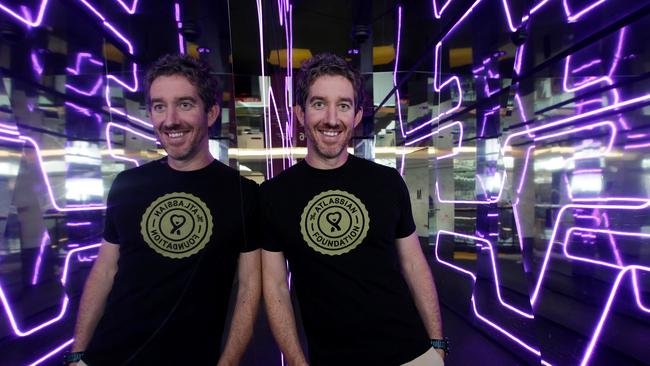Philanthropy the heart of Atlassian
Atlassian founders Scott Farquhar and Mike Cannon-Brookes decided early in their careers to give away 1 per cent of profits.

Traditionally successful business people have waited until they retire before they start giving back, says Scott Farquhar, one of Australia’s richest people.
“Generations older than me think of philanthropy as something you do at the end of a long and storied career,” the Atlassian co-founder told a Sydney business event.
“If you look at the approach of a generation younger than me, they don’t want to wait for 50 or 60 years before they give back.”
And that’s the approach adopted by Farquhar and Mike Cannon-Brookes — now each worth around $13bn — who decided very early in their business careers that they would follow the “1 per cent rule” to give away 1 per cent of profits, product, staff time and equity to philanthropy each year.
Farquhar told the recent BESydney (Business Events Sydney) annual dinner that making the promise had been easy in the early days when Atlassian was not really off the ground. But as the company has grown to a global workforce of 4000 and annual revenue of more than a billion dollars, so has the duo’s philanthropy.
In recent years they have spearheaded the “Pledge 1 per cent” program which encourages corporates to sign up. So far about 10,000 people around the world have taken the pledge.
Farquhar said Atlassian was keen to see signing the pledge become a natural and easy part of registering a company — in effect, simply ticking a box on the paperwork to commit companies to giving away wealth and time as they grow.
He also revealed that Atlassian plans to push the Australian Taxation Office to remove uncertainty regarding the tax treatment that applies when companies and founders donate equity.
The idea is that more people would likely sign up and make the pledge legally binding if they had certainty that doing so would not have a negative impact on the tax deduction they receive when they make the donation.
Farquhar argues that Australia has the capacity to play in a global tech space, noting that 52 companies founded by Australians since 2011 are worth more than $100m, 14 are worth more than $500m and six are worth more than $1bn.
He said there were only three types of companies in today’s economies — tech companies, those trying to become tech companies and those being disrupted by tech.
“Australia produces approximately 1.5 per cent of the world’s GDP,” he said. “If we want to maintain our standard of living, if we want our kids to have meaningful jobs, we need to ensure we produce 1.5 per cent of the world’s technology, the world’s software.”
Atlassian is a global company but its commitment to its Australian heritage is strong with 1500 employees in Sydney.
It will be the anchor tenant in a new tech precinct at Sydney’s Central Station, being developed with the help of the NSW government. The Sydney Innovation and Technology Precinct would be an “engine room for ideas” and would revitalise the central station area, Farquhar said.
The location would make it easy for talented people to catch public transport into the tech hub from all over Sydney.
He said the biggest issue for tech companies like Atlassian was access to talent. Immigration policies must allow entry to Australia for the best people: one experienced person from overseas “trains a dozen here”. One of the issues was that skilled migration categories sometimes lagged demand: they included cabinet maker and hairdresser, but not IT manager, for example.
“The categories are refreshed every five years but the tech industry has jobs that didn’t exist five years ago,” he said.
Farquhar, who grew up in a working-class family in western Sydney, praised the government school education he received at the selective high school, the James Ruse Agricultural High School — which he said produced a median university entrance score of 98.5.
In contrast, Cannon-Brookes, the son of banking and financial services executive Michael Cannon-Brookes, went to the exclusive private school Cranbrook.
But Farquhar doesn’t exaggerate the difference, saying that rather like a private school, James Ruse is also a microcosm as a highly selective school with surprises in store for students when they hit the real world.




To join the conversation, please log in. Don't have an account? Register
Join the conversation, you are commenting as Logout